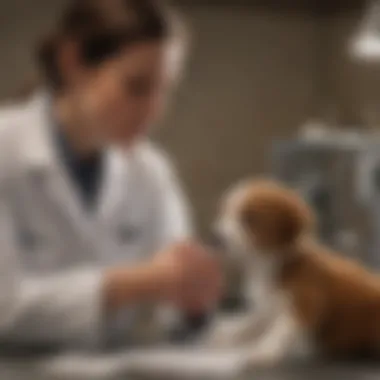Understanding the Importance of Rabies Shots for Puppies


Intro
Rabies is a viral disease with dire consequences for both animals and humans. Vaccination is the key method for preventing rabies, especially in young, vulnerable animals like puppies. This section aims to clarify the reasons for rabies shots, presenting the information in an accessible yet thorough manner.
Animal Profile
General Overview
Puppies, the young form of domestic dogs, require careful attention to their health. They are affectionate pets and strong companions. Understanding the basics of their health needs, particularly vaccination, is crucial for every owner.
Habitat and Distribution
Puppies thrive in domestic environments, alongside humans. Their habitat ranges from homes to local parks where they socialize, exercise and explore. The widespread presence of domestic dogs makes the risk of rabies exposure significant, especially in regions where wildlife carries the virus.
Fascinating Facts
Unique Traits and Adaptations
Puppies exhibit unique traits, like their capacity to adapt to human families. Their social behavior plays a vital role in bonding and training. However, their young immune systems face challenges. Without proper vaccinations, they can easily succumb to diseases, including rabies.
Historical and Cultural Significance
Historically, dogs have been companions to humans for thousands of years. Their roles have evolved from working animals to beloved pets. This deep relationship underscores the importance of ensuring their health through vaccinations like the rabies shot.
Conservation Status
Current Population Trends
The population of domestic dogs and, consequently, puppies continues to rise. Yet, this increase raises concerns regarding overpopulation and stray animals, often leading to higher rabies transmission risk, particularly in unvaccinated populations.
Threats and Challenges
Threats to puppy health include exposure to rabies, which can be fatal. Challenges also involve a lack of awareness among new pet owners about the importance of vaccination schedules and their implications for public health.
Care Tips for Pet Owners
Basic Needs and Requirements
Basic needs for puppies entail proper nutrition, socialization, and medical care. Vaccinations, particularly rabies shots, form a pivotal part of their wellbeing. Pet owners should adhere to recommended vaccination timelines to keep their puppies safe.
Health and Wellness Tips
- Regular Vet Check-ups: Schedule routine visits to monitor health progress.
- Keep Vaccination Records: Maintain proper documentation of vaccinations.
- Socialize Early: Expose puppies to different environments and situations safely.
Rabies vaccination not only protects your puppy but also helps in safeguarding public health.
Awareness and education are essential components of responsible pet ownership. By understanding the significance of rabies shots, pet owners can contribute to a healthier and safer community.
Prolusion to Rabies
Rabies is a viral disease that poses significant health risks to both pets and humans. Understanding this disease is essential for puppy owners, as it lays the foundation for informed decisions regarding vaccination and overall pet care. This section will delve into the nature of the rabies virus, its transmission, and the associated risk factors.


Overview of the Rabies Virus
Rabies is caused by the rabies virus, which belongs to the Lyssavirus genus. This virus primarily affects mammals, including dogs and humans. Once a puppy contracts the virus, it can result in severe neurological symptoms, often leading to death. Symptoms may include confusion, paralysis, and aggressive behavior. The incubation period for rabies can vary, making it especially dangerous since infected animals may not show symptoms for weeks or months. This delay complicates the management of the disease and increases the likelihood of transmission.
A statistic of note: According to the World Health Organization, over 59,000 deaths occur annually due to rabies, predominantly in Asia and Africa. This highlights the need for effective vaccination strategies, especially in puppies who are more vulnerable than adult dogs.
Transmission and Risk Factors
The rabies virus is primarily transmitted through the saliva of infected animals via bites. Common carriers include bats, raccoons, skunks, and foxes. Puppies are at a higher risk if they roam freely outdoors or are exposed to wildlife. Additionally, unvaccinated dogs are more susceptible to infections from contact with rabid animals.
In common scenarios, a puppy may be bitten by another infected dog or wild animal while playing outside. Furthermore, in areas where rabies is prevalent, the risk increases significantly during certain seasons or in certain environments. An important point to remember is that rabies is also zoonotic. This means it can be transmitted from animals to humans, stressing the importance of vaccination not only for the safety of pets but also for public health.
In summary, understanding the rabies virus and its modes of transmission is crucial for all puppy owners. By recognizing these factors, owners can take proactive steps to protect their pets and themselves from this deadly disease.
The Importance of Vaccination
Vaccination is an essential component of preventive health care for puppies. It serves as a first line of defense against infectious diseases, including rabies. The significance of vaccinations extends beyond the individual puppy's health; it encompasses community health as well. Ensuring that puppies are vaccinated against rabies is a critical measure for protecting both pets and humans from this potentially fatal virus. The process helps to create herd immunity, which is crucial for preventing outbreaks and controlling the spread among animals.
How Vaccination Works
Vaccination introduces a harmless component of the disease agent into the puppy’s body. This can be a weakened or inactivated virus, or a piece of the virus's genetic material. The immune system then recognizes this foreign element and begins to produce antibodies. These antibodies help the puppy's immune system develop a memory of the virus.
Upon exposure to the real virus in the future, the immune system can react more quickly and efficiently. This mechanism reduces the chances of contracting the disease and helps to build long-lasting immunity. Essentially, vaccinations prepare the body for future infections, providing protection that is vital for the health of both the puppy and the broader community.
Long-Term Benefits of Vaccination
Vaccinating puppies has numerous long-term benefits. First and foremost, it significantly reduces the risk of rabies, a viral infection that can be fatal. By getting rabies shots, puppies contribute to the overall health of the pet population.
Here are some additional benefits:
- Community Safety: High vaccination rates lead to reduced rabies transmission among wildlife and domestic animals, protecting public health.
- Cost-Effective Health Care: Preventing disease through vaccination is often less expensive than treating a disease after it occurs. Veterinary bills related to treatment can be quite high.
- Peace of Mind: A vaccinated puppy provides reassurance to owners that they are protecting their pet and their family from rabies.
- Better Quality of Life: Vaccinated dogs are less likely to get sick and can participate freely in social activities.
Understanding Rabies Shots for Puppies
Rabies vaccination is a critical aspect of puppy healthcare. It protects not only individual pets but also communities by minimizing the risks associated with this deadly virus. The rabies virus is universally fatal once symptoms appear, making vaccination even more essential for puppies who are particularly vulnerable. Vaccinations are not only about health; they reflect responsible pet ownership.
When to Vaccinate Your Puppy
Determining the right time to vaccinate your puppy is vital. Generally, the rabies vaccine should be administered when a puppy is between 12 to 16 weeks old. There are several considerations to keep in mind:
- Age: Puppies should receive their first vaccination around three months old. This timing ensures that the vaccine is effective, as maternal antibodies fade by this age.
- Local regulations: Some areas have laws that require rabies shots by a certain age.
- Health: If your puppy is unwell, it may be advisable to wait until their health improves before vaccination.
In some cases, state regulations may stipulate different age requirements. It is always best to consult with your veterinarian to tailor the vaccination plan for your puppy’s specific needs.
Recommended Vaccination Schedule
A vaccination schedule helps ensure thorough protection against rabies and other illnesses. The general recommendation is as follows:
- First Vaccine: Administered between 12-16 weeks of age.
- Booster Shot: Given one year after the first vaccine.
- Subsequent Boosters: Many regions require boosters every one to three years, depending on local laws and veterinary advice.
Ensure you keep records of your puppy’s vaccinations. This information will be necessary for boarding kennels or dog parks that require proof of vaccination. It is also advisable to maintain ongoing communication with your veterinarian. They can provide guidance on any changes in local vaccination requirements or best practices as your puppy grows.
Proper vaccination is an essential step in protecting your puppy’s health and your community's well-being.


In summary, understanding when to vaccinate your puppy and following a structured schedule are crucial components in safeguarding your pet and public health. By adhering to these guidelines, owners can promote a safe environment for their pet and others.
Potential Side Effects of Vaccination
Vaccination is a significant aspect of pet care, particularly for puppies. However, understanding the potential side effects is essential for responsible pet ownership. These side effects, while typically mild and temporary, can vary from one puppy to another. Owners should be aware of these possibilities, as they help in making informed decisions regarding their pet's health.
Being informed not only contributes to better veterinary practices but also fosters a more positive experience during the vaccination process. Knowing what to expect can ease the anxiety many new pet owners feel about vaccinating their puppies.
Common Side Effects
Most puppies experience mild side effects after receiving rabies shots. Understanding these can calm fears and provide clarity on what is normal:
- Lethargy: It’s common for puppies to feel a bit tired after vaccination. They might not want to play or be as active as usual, which should resolve within a day or two.
- Slight Fever: A mild increase in body temperature can occur as the immune system responds to the vaccine. Keep track of your puppy’s condition but usually, this is not a cause for concern.
- Appetite Changes: Some puppies might eat less or show interest in food after vaccination. Most return to their normal eating habits shortly thereafter.
- Soreness at Injection Site: It's not unusual for the area where the shot was given to be slightly swollen or painful. This generally subsides within a few days.
Overall, these common side effects are typically not serious and may indicate that the puppy's immune system is responding positively to the vaccine. However, monitoring is crucial.
Severe Reactions and When to Seek Help
In rare cases, puppies can experience severe reactions to vaccinations. These serious side effects are uncommon, but awareness is vital for quick response:
- Anaphylactic Shock: This is a life-threatening allergic reaction that can occur within minutes. Signs include difficulty breathing, swelling of the face, hives, and rapid heartbeat.
- Severe Vomiting or Diarrhea: If your puppy experiences excessive vomiting or diarrhea after vaccination, it is essential to contact your veterinarian.
- Seizures or Unusual Behavior: If you notice seizures or excessive lethargy beyond the expected recovery period, it’s important to seek veterinary care.
Always consult your veterinarian if you notice anything concerning after vaccination. They can provide guidance and support tailored to your puppy's needs.
Being proactive in understanding and monitoring your puppy for these reactions significantly aids in their overall health. In summary, it is a balance of awareness and caution. Practice vigilance to ensure that both common and severe side effects are handled appropriately.
Legal and Ethical Considerations
The discussion surrounding rabies vaccinations for puppies encompasses not only medical insights but also legal and ethical aspects. Understanding these considerations is crucial in ensuring that pet owners comply with both local laws and ethical standards. This section will elucidate the importance of these factors in the larger context of public health and pet safety.
Local Laws on Rabies Vaccination
Rabies vaccination laws vary significantly across different regions and can influence the wellbeing of puppies and communities. Most jurisdictions have mandates requiring pets to be vaccinated against rabies, reflecting a commitment to public health. These laws often stipulate certain timelines, specifying when puppies should receive their initial shots as well as booster doses.
For instance, in some areas, it may be a legal requirement for puppies to receive their first rabies vaccine by four months of age. Failure to comply can result in penalties or fines for pet owners. Additionally, local health authorities often keep records of rabies vaccinations, which are crucial during any incident involving potential rabies exposure.
Moreover, animal control laws sometimes enforce penalties against unvaccinated pets. These regulations illustrate the importance of rabies vaccines not just for individual animals but for community safety. The spread of rabies poses a threat not only to dogs but also to humans and wildlife. Thus, adhering to local laws is vital in curbing this preventable and deadly disease.
“The rabies vaccine is not just a safeguard for pets, but a critical public health measure.”
Ethics of Puppy Vaccination
Beyond mere compliance with legal requirements, ethical considerations play a significant role in the discourse on puppy vaccinations. Vaccination against rabies represents a moral responsibility for pet owners. It is an essential facet of responsible pet ownership that helps protect vulnerable populations—both animals and humans.
From an ethical standpoint, one must consider the consequences of choosing not to vaccinate. Unvaccinated puppies can become vectors for rabies, leading to potentially fatal outcomes for other animals and even humans. The act of vaccinating transcends mere compliance; it embodies a sense of duty to contribute positively to the communal environment.
Furthermore, this ethical obligation extends to education. Pet owners should be proactive in informing themselves about the importance of rabies shots and advocating for their pets' health. Engaging in discussions with veterinarians, attending community health events, and sharing information reinforces a culture of responsibility and awareness.
In summary, legal mandates regarding rabies vaccinations align closely with ethical responsibilities. Such regulations serve not only to protect individual pets but also to safeguard the health of entire communities. Upholding these legal and ethical standards is key to preventing rabies and fostering a safer environment for all.
Puppy Health and Wellness Beyond Vaccination
Puppy health is a broad topic that goes beyond just vaccination. While rabies shots are vital for preventing a deadly virus, they form only one part of an intricate network of care necessary for a puppy's well-being. Ensuring holistic health involves several key elements, from proper nutrition to regular veterinary check-ups.


Nutrition and Care
Nutrition plays a crucial role in the growth and development of puppies. A balanced diet helps develop strong bones, healthy skin, and a robust immune system. Puppies require food rich in protein, fats, vitamins, and minerals. It is essential to select high-quality puppy food that meets the specific needs of their breed and size.
- Types of Food: Consider commercial puppy formulas or consult a vet for homemade diet options. Look for foods labeled as “complete” and “balanced.”
- Feeding Schedule: Puppies generally need three to four meals a day. As they grow, this may reduce to two meals.
- Hydration: Always provide fresh water. Proper hydration supports all bodily functions, and lack of water can lead to health issues.
In addition to nutrition, consistent care practices positively impact puppy health. Routine activities such as grooming, training, and socialization are vital. Regular grooming not only keeps your puppy clean but also allows for early detection of skin issues or parasites. Training serves to strengthen the bond between owner and puppy and address behavioral problems before they escalate.
Regular Check-ups
Regular veterinary check-ups are essential for maintaining your puppy's overall health. During these visits, veterinarians can monitor growth, administer booster vaccinations, and perform health screenings. These check-ups help catch problems early before they become severe.
- Recommended Frequency: Puppies should see the vet every few weeks until about four months of age and thereafter annually for vaccinations and health examinations.
- Common Screenings: Routine checks include weight monitoring, dental assessments, and parasite screenings. These procedures play a critical role in preventing and managing health issues.
- Owner Vigilance: Being proactive about changes in your puppy’s behavior or health can make a significant difference. Report any unusual signs, such as lethargy, changes in appetite, or odd behaviors, to your veterinarian.
The Role of Veterinarians
Veterinarians play a vital role in the health and well-being of puppies, especially concerning vaccinations against rabies. Their expertise ensures that pets receive the appropriate care and immunizations at the right time. This section discusses how veterinarians guide puppy owners through various aspects of rabies vaccinations and other health concerns, reinforcing the necessity of medical consultation for pet care.
Choosing a Veterinarian
Selecting a veterinarian is a significant decision for pet owners. The choice can directly impact the health of a puppy. Here are a few considerations to keep in mind:
- Qualifications: It is crucial to verify the veterinarian’s education and experience. Look for certifications from accredited veterinary schools.
- Specialty: Some veterinarians specialize in specific areas, such as canine health or infectious diseases. Finding one with expertise in vaccinations is beneficial.
- Facility: A well-equipped clinic indicates a commitment to animal care. Observing cleanliness and functionality can also be a deciding factor.
- Reviews and Recommendations: Gathering opinions from other pet owners can provide insights into a veterinarian's reputation and service quality.
A proficient veterinarian not only performs vaccinations but also addresses any questions or concerns about puppy care as well as rabies transmission. Their guidance can significantly ease the vaccination process.
Veterinarians' Recommendations
Veterinarians' recommendations regarding rabies shots are based on extensive research and guidelines established by health organizations. Key elements include:
- Vaccination Timing: Veterinarians will usually provide a vaccination schedule, outlining when the first rabies shot should be administered, generally around 12 to 16 weeks of age.
- Booster Shots: These are critical for maintaining immunity. Regular follow-ups are essential, as they fortify a puppy's defenses against rabies.
- Health Assessments: Prior to vaccination, a veterinarian will evaluate the overall health of the puppy. This step is crucial, as underlying health issues may influence the vaccination process.
- Post-Vaccination Care: After administering the rabies shot, veterinarians offer advice on monitoring for side effects and signs of discomfort that may arise.
Veterinarians are the first line of defense in preventing rabies and ensuring proper vaccination for puppies. Their role transcends mere administration of shots; they are vital educators for responsible pet ownership.
Choosing the right veterinarian ensures a trustworthy partnership, fostering an environment of health and safety for both puppies and their communities.
Culmination
Vaccination against rabies is not just a routine procedure; it is an essential practice that affects the health of puppies and the safety of the community at large. The rabies virus poses a significant threat. It can lead to severe consequences not only for infected animals but also for humans who may come into contact with them. Rabies shots for puppies help to proactively mitigate this risk.
Recap on the Importance of Rabies Shots
To summarize, rabies shots serve multiple critical purposes. First, they protect puppies from potentially fatal infections if they are exposed to the virus. Puppies, due to their immune systems still developing, are particularly vulnerable. Ensuring they receive timely vaccinations can safeguard their health and well-being.
Second, by vaccinating puppies, pet owners contribute to broader community health efforts. The rabies virus can be transmitted through bites, and unvaccinated pets may serve as vectors for the disease. Vaccinating a pet means fewer chances of the virus spreading among local animal populations and into human communities.
Here are key benefits of rabies vaccinations for puppies:
- Provides immunity against a fatal disease.
- Reduces the risk of rabies outbreaks in the community.
- Reinforces responsible pet ownership practices.
- Fulfills legal requirements in many jurisdictions.
Encouraging Responsible Pet Ownership
Responsible pet ownership extends beyond providing food and shelter. It encompasses understanding and addressing health needs, which include vaccinations. Pet owners must recognize that their decisions have significant implications, not only for their pets but for public health.
This article has emphasized the importance of rabies vaccinations. Responsible owners should familiarize themselves with vaccination protocols. Following the recommended vaccination schedule for rabies shots is a duty that should not be taken lightly.
Moreover, educating oneself about the potential risks of skipping vaccinations can lead to better decision-making. It's vital to engage with veterinarians. Owners should seek advice about the health of their puppies and remain proactive about preventive care. In fostering a culture of responsible pet ownership, we not only look after our pets but also protect the community at large.
By promoting awareness around the significance of rabies shots, we encourage a collective responsibility that benefits everyone. Thus, owning a pet should always mean being an informed and responsible individual.















